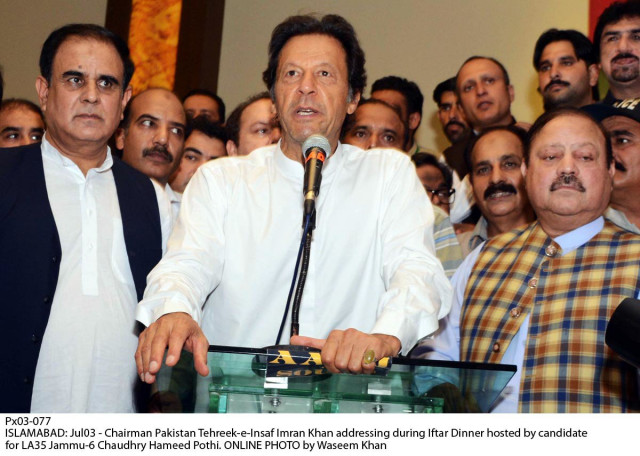Power tussles, perceptions and the politics of integration
Unrest is not only confined to policy-making bodies, similar situation exists in all dephts

PTI leaders need to realise fruits of the politics of integration and mutual understanding which could help them give effect to change. PHOTO: APP
Recently, claims of good governance in Khyber-Pakhtunkhwa were called into question when a highly credible retired civil officer Shakil Durrani resigned as chairperson of Pakhtunkhwa Energy Development Organisation (PEDO). Several members of the organisation’s board of directors also tendered their resignations.
Shakil has a positive image in bureaucratic circles as well as the socio-political milieu. Citing the reasons for his resignation, he said, “PEDO was suffering from incompetence, lack of effective systems and a dysfunctional organisational structure.”
He added, “I repeatedly tried to get matters addressed at the appropriate levels. However, I found to my consternation that both Minister of Energy Muhammad Atif Khan and PEDO CEO Akbar Ayub lack interest in improving matters. They wanted to retain arbitrary control.”
Amid tussles
There is also considerable unrest within the police force. Ministers and PTI lawmakers are reluctant to amend Police Order, 2001 as per IGP Nasir Khan Durrani and his aides’ recommendations.
Even some high-ranking police officers allege that before amendments and new legislations, the force was made ineffective through the withdrawal of powers and authorities.
There now exists a visible distance in central police offices, Civil Secretariat and Chief Minister’s Secretariat.
Setting a precedent
Since the PTI-led coalition came into power in May 2013, unrest and panic among executives has sharpened to a flashpoint.
Shortly after the 2013 general elections, Mohammad Ali Babakhel, a journalist-turned policeman refused to accept interference in his work and pleaded to be relieved in formative days of PTI-led government. He had replaced another senior most police officer Liaqat Ali Khan. Liaqat Ali was subsequently reposted in his position.
The second was a former chief secretary Arbab Shehzad, who on grounds of ‘differences’ with the chief minister preferred to become federal secretary for trade and economic affairs. He was replaced by Amjad Ali Khan, who still occupies the office.
During this period, a large number of high-ranking civil bureaucrats and police officers opt for transfer to centre or other provinces and administrative units or opted for less important offices instead of responsible, field and public offices.
A couple of months ago, Lieutenant General (retd) Hamid Khan, who was serving as Khyber-Pakhtunkhwa Ehtesab Commission managing director, jolted the socio-political scene by announcing his resignation.
In his resignation letter, he said a series of amendments had made the post of director general redundant and thereby rendered the accountability process controversial and questionable.
Later, Ziaullah Toru, director of the Anti-Corruption Establishment was removed when he, on the request of a PTI MPA who is leading the Billion Tree Tsunami campaign, initiated an enquiry into corrupt practices within the drive.
Order of the day
Unrest is not only restricted to highly responsible administrative departments and policy-making bodies. A similar situation exists in all departments. Posting, transfers and reshuffling in all these departments have become the order of the day.
On such grounds, all these departments have yet to improve its performances and service deliveries according to PTI chief Imran Khan’s agenda of change.
A few days ago, while concluding debate on budgetary allocations in the Khyber-Pakhtunkhwa Assembly, Chief Minister Pervez Khattak voiced his disappointment over affairs of the health department.
Similarly, the result for Secondary School Certificate examinations also confirmed the declining performances of students at government schools. The same situation exists in other departments and various sectors have failed to implement their agenda.
Imran needs to take concrete steps to put the affairs of K-P government on its right direction. PTI leaders need to realise fruits of the politics of integration and mutual understanding which could help them give effect to change.
Published in The Express Tribune, July 4th, 2016.













COMMENTS
Comments are moderated and generally will be posted if they are on-topic and not abusive.
For more information, please see our Comments FAQ